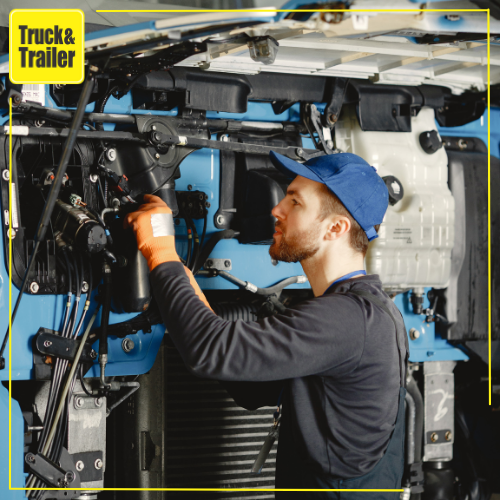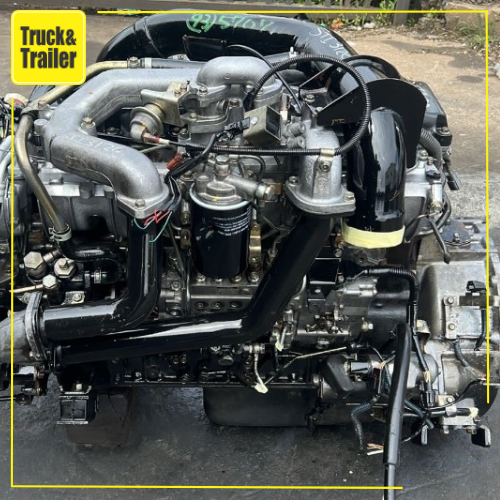
The Ultimate Guide to Properly Clean a Truck Engine
Date: 16/01/2023
Keeping a truck engine clean and well-maintained is essential for optimal performance and longevity. Regular cleaning not only improves the efficiency of the engine but also ensures a longer lifespan, reduced repair costs, and a better overall driving experience. In this ultimate guide, we will walk you through the process of how you can properly clean a truck engine, step by step. So, let's dive in and learn how to give your truck engine the attention it deserves. Take a look at the wide selection of truck spares and parts available for sale on Truck & Trailer.

Why Should You Clean a Truck Engine Regularly?
Cleaning a truck engine on a regular basis is crucial for several reasons. Firstly, a clean engine allows for better airflow, resulting in improved fuel efficiency and power. Secondly, removing dirt, grease, and debris helps prevent clogging, ensuring the engine's cooling system operates optimally. Thirdly, regular cleaning allows you to identify potential issues such as leaks or loose connections early on, preventing major breakdowns and costly repairs. Lastly, a clean engine not only looks good but also adds value to your truck should you decide to sell or trade it in the future.
Step-by-Step Guide to Cleaning a Truck Engine:
- Step 1: Prepare Your Work Area
Before you start, make sure to park your truck in a well-ventilated area, away from any flammable materials. It's also a good idea to lay down a protective tarp or plastic sheet to catch any drips or debris during the cleaning process.
- Step 2: Disconnect the Battery
To ensure safety, disconnect the negative terminal of the battery before you begin cleaning. This prevents any accidental electrical discharges and protects both you and the electronic components of your truck's engine.
Step 3: Remove Loose Debris
Using a brush or compressed air, gently remove any loose debris from the engine bay, such as leaves, dirt, and dust. Be careful not to dislodge any wires or hoses while doing this.
- Step 4: Apply Engine Degreaser
Choose an appropriate engine degreaser and spray it generously over the engine components. Make sure to cover all areas, paying close attention to the greasiest parts. Allow the degreaser to sit for a few minutes, loosening the dirt and grime.
- Step 5: Scrub the Engine
Using a soft-bristle brush or an old toothbrush, start scrubbing the engine components. Focus on areas with excessive grease or grime buildup. Gently scrub in circular motions without applying too much pressure to avoid damaging any sensitive parts. Continue until the engine looks clean.
- Step 6: Rinse Thoroughly
Once you've finished scrubbing, it's time to rinse off the degreaser and loosened dirt. Use a gentle stream of water from a hose or a pressure washer, making sure to avoid direct contact with electrical components. Take extra care while rinsing near the air intake or any sensitive engine parts.
- Step 7: Dry the Engine
After rinsing, carefully dry the engine using a clean microfiber cloth or compressed air. Make sure to remove any excess moisture to prevent corrosion or water damage.
- Step 8: Reconnect the Battery
Once the engine is completely dry, reconnect the battery by attaching the negative terminal securely. Ensure the connection is tight but be cautious not to overtighten.
- Step 9: Inspect and Finish
After cleaning, take a close look at the engine for any signs of leaks, loose wires, or damaged components. If you notice anything unusual, it's recommended to consult a professional mechanic to avoid further complications. Finally, apply a protective engine dressing or polish to enhance the engine's appearance and protect it from future dirt and grime buildup.

FAQs:
1. How often should I clean my truck engine?
Cleaning your truck engine every six months is generally recommended. However, if you frequently drive off-road or in dusty conditions, it's advisable to clean it more frequently.
2. Can I clean my truck engine with just water?
Using water alone to clean your truck engine may not be sufficient for removing stubborn grease and grime. It's recommended to use an engine degreaser for effective cleaning.
3. Is it necessary to disconnect the battery before cleaning the engine?
Yes, disconnecting the battery is crucial to ensure your safety and prevent any electrical mishaps. Always prioritise safety when working around the engine components.
4. Can I use a pressure washer to clean my truck engine?
While a pressure washer can be used to rinse the engine, caution is advised. High pressure can force water into sensitive areas, leading to electrical damage. Always maintain a safe distance and adjust the pressure accordingly.
5. Should I seek professional help for cleaning my truck engine?
If you are unsure about the process or notice any issues during the cleaning, it's best to consult a professional mechanic. They can provide guidance and handle any necessary repairs or maintenance tasks.
Cleaning your truck engine regularly is a vital task to ensure optimal performance and longevity. By following the step-by-step guide provided in this article, you can effectively clean your truck engine and maintain its efficiency. Remember, a clean engine not only improves performance but also adds value to your investment. So, take the time to clean your truck engine properly and enjoy the benefits it brings. Check out Truck & Trailer wide range of truck parts and spares.








